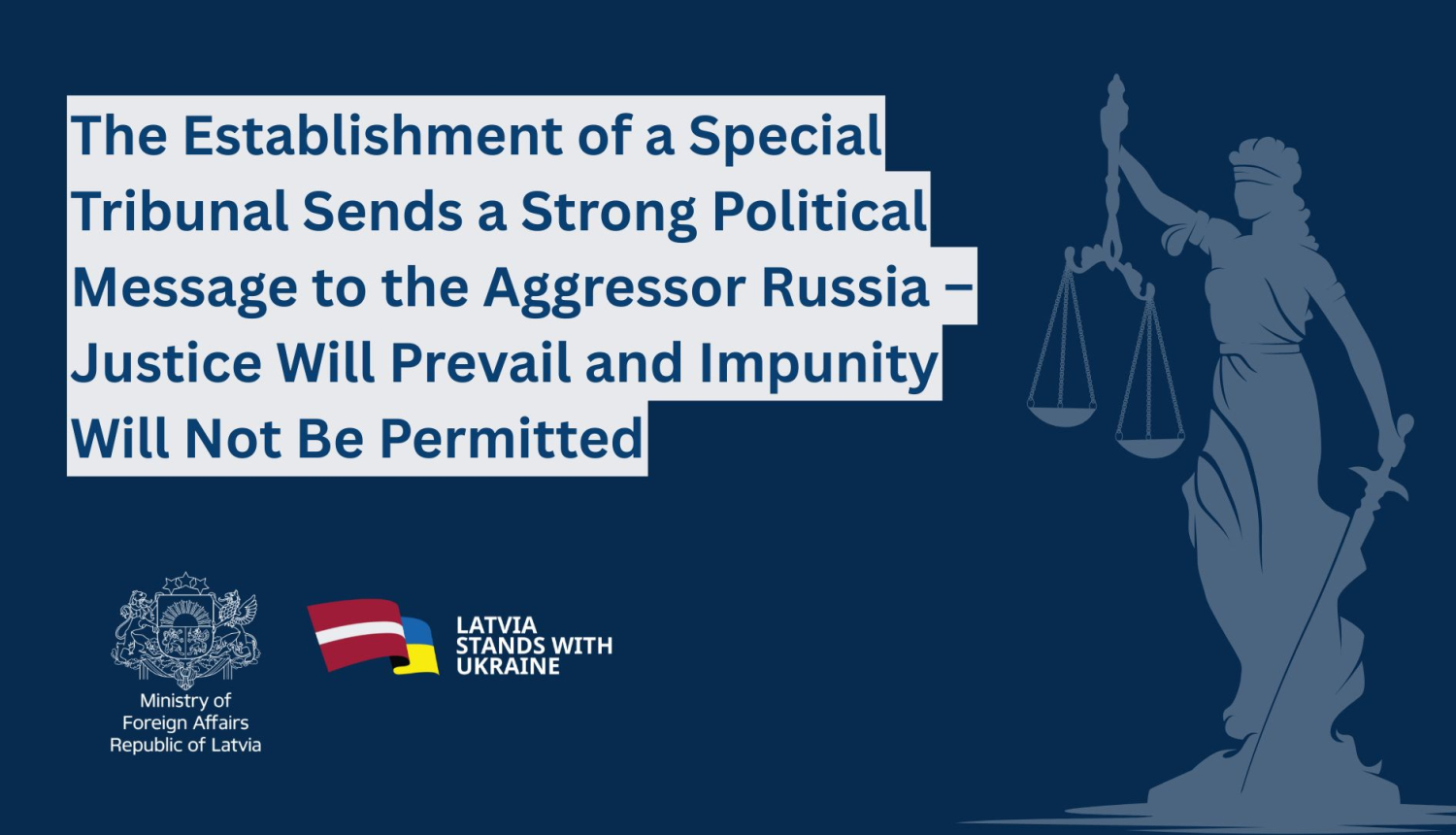Latvia welcomes the signing of the Agreement on the Establishment of a Special Tribunal for the Crime of Aggression against Ukraine by the President of Ukraine, Volodymyr Zelenskyy, and the Secretary General of the Council of Europe, Alain Berset. Latvia underlines that the establishment of the Special Tribunal sends a strong political message to the aggressor Russia – justice will always prevail, and impunity will not be permitted.
The Special Tribunal marks a significant development in international criminal law, as for the first time since the Nuremberg and Tokyo Tribunals, a court will have jurisdiction over the crime of aggression – a crime against peace.
Alongside the signing of the Agreement, the Statute of the Tribunal was adopted, defining the substantive and procedural rules applicable in the Tribunal. For the Agreement to enter into force, it must still be ratified by the Verkhovna Rada, Ukraine’s parliament. The Committee of Ministers of the Council of Europe previously decided to authorise the Secretary General to sign the Agreement, with Latvia voting in favour of this decision.
As the signing of the Agreement represents the first concrete step in establishing the Special Tribunal, the Ministry of Foreign Affairs will continue to keep this issue high on the agenda of the Council of Europe and the broader international community in order to support that the process of setting up the Tribunal proceeds without delay and that as many countries as possible join the collective efforts to end impunity for the crime of aggression against Ukraine and to promote a lasting and just peace.
Since the launch of Russia’s full-scale invasion of Ukraine on 24 February 2022, Latvia has strongly supported the creation of a special international tribunal to address the crime of aggression against Ukraine.
- In June 2022, to draw international attention to the matter, the Permanent Missions of Latvia and Liechtenstein to the United Nations in New York organised a Yale Club Roundtable discussion, highlighting the need to establish a special tribunal and exploring its legal aspects.
- In January 2023, Latvia responded to Ukraine’s call to join the Core Group on the Establishment of a Special Tribunal for the Crime of Aggression against Ukraine, and has since been an active participant in the group’s work.
- On 22 November 2024, Latvia hosted the 12th meeting of the Core Group in Riga. The Vienna–Riga Statement was adopted, affirming a shared commitment to establishing a tribunal with broad international support and legitimacy, ensuring effective accountability of Russia’s highest leadership.
- On 9 May 2025 – Europe Day – in Lviv, Ukraine, EU foreign ministers and other representatives adopted the Lviv Statement, agreeing to conclude the Core Group’s work on establishing the Special Tribunal.
Ukraine formally submitted its request to the Council of Europe to establish the Special Tribunal on 13 May 2025. The following day, foreign ministers of the Council of Europe approved the initiative during a meeting in Luxembourg, instructing the Secretary General to proceed with the Tribunal’s creation.
The Agreement on the Establishment of the Special Tribunal for the Crime of Aggression against Ukraine was signed by President Zelenskyy and Secretary General Berset on 25 June 2025 in Strasbourg.
To ensure international support for the Tribunal, strengthen its legitimacy, secure funding, and facilitate its operation, the Committee of Ministers of the Council of Europe will soon need to decide on the establishment of an Enlarged Partial Agreement. This framework would be open not only to Council of Europe member states, but also to non-member countries and the European Union.
The Special Tribunal will exercise its jurisdiction over the crime of aggression against Ukraine – a crime committed by the highest political and military leadership. Although current legal, political, and practical circumstances prevent the prosecution of a sitting head of state, head of government, or foreign minister, the Tribunal will be able to conduct investigations, gather evidence, and prepare indictments against those responsible. The body of evidence collected will legally establish the act of aggression and identify its perpetrators – a step of lasting and vital importance for the international community’s collective memory.




